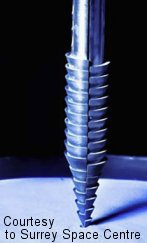Ultrasonic penetrators for planetary soils
Other planets can present a difficult environment for exploration. Mars, for example, which may have a hugely interesting story preserved under the surface, has about one-third of Earth’s gravity and therefore will produce significantly lower weight on bit (WOB) when drilling is attempted. Without sufficient WOB, the effectiveness of conventional drilling techniques can be severely reduced. Attempted rotary drilling might even result in spinning the rover and not the drill bit.
Our Approach
 Nature has often helped to inspire some of the greatest innovations, having had millions of years to perfect its designs through trial and error. Wood boring wasps possess the capability to drill into wood to depths comparable to their size, and research carried out at the Surrey Space Centre of the University of Surrey has investigated how this can be applied to space exploration. We are now working with researchers at Surrey to combine ultrasonic vibration with the wood wasps’ technique, because high-frequency vibration appears to be able to affect the soil in such a way as to reduce the forces we need to apply.
Nature has often helped to inspire some of the greatest innovations, having had millions of years to perfect its designs through trial and error. Wood boring wasps possess the capability to drill into wood to depths comparable to their size, and research carried out at the Surrey Space Centre of the University of Surrey has investigated how this can be applied to space exploration. We are now working with researchers at Surrey to combine ultrasonic vibration with the wood wasps’ technique, because high-frequency vibration appears to be able to affect the soil in such a way as to reduce the forces we need to apply.
Why is this research important?
Exploring beneath the surface of other planets will help us learn more about their individual histories and the wider formation of the solar system. On Mars, for example, the weak magnetic field cannot protect the surface from solar radiation and some organic chemistry might only be preserved underground. Tools such as this can open up this protected region to future landers and therefore could help us to determine the conditions that used to prevail on other planets when life was just getting started here. This knowledge will help us to understand what makes the Earth so very special today.
Further information about the Surrey team

